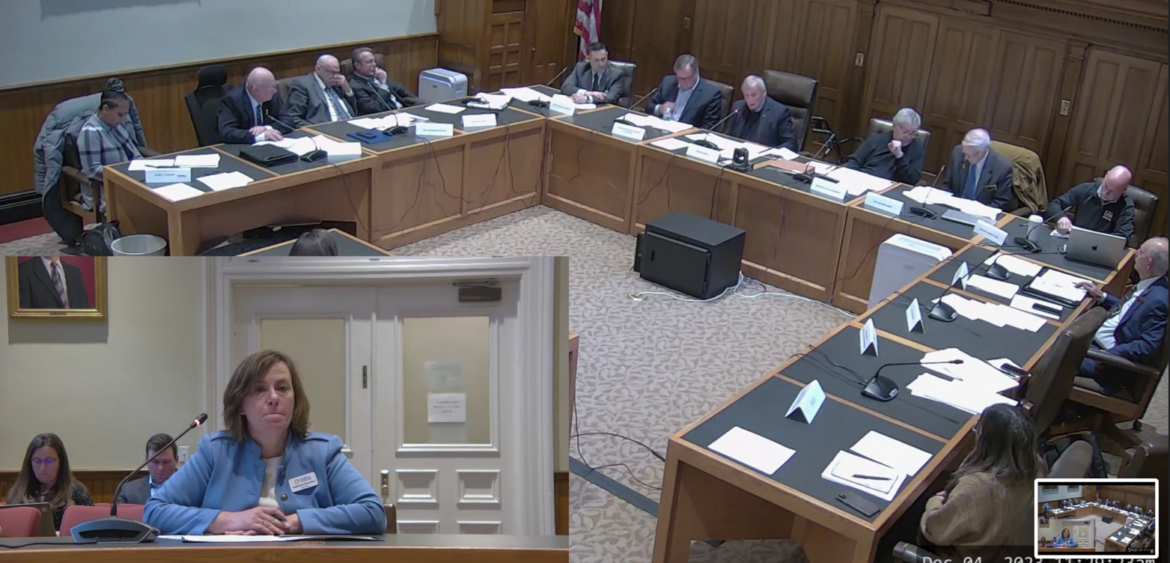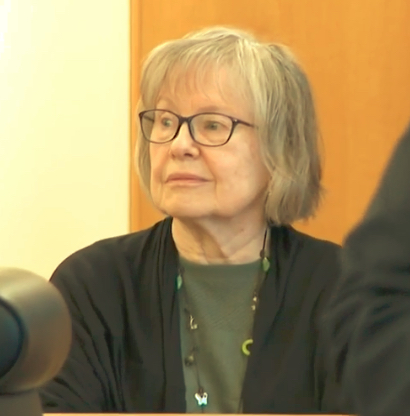By GARRY RAYNO, InDepthNH.org
CONCORD — Several key issues the Commission to Study the Effect of Recent Changes Made to Charitable Gaming Laws were touched on at its meeting Monday with more detailed discussions coming in the future.
One controversial issue the legislature has grappled with is a continuing moratorium on new charitable gaming facilities able to offer historic horse racing games, which have performed well above expectations.
While facilities not operating before the new video game was introduced, seek to join in the large jackpots the racing provides, to date they have been blocked.
The House Ways and Means Committee last month approved a plan to make the moratorium permanent, with the understanding it could be changed by a future legislature.
The prime sponsor of the plan, Rep. Fred Doucette, R-Salem, told the commission the plan would allow present operators who have applied or are in process of securing historic horse racing to continue, but outside of that “the window would be closed.”
Currently 10 of the 14 charitable gaming facilities offer historic horse racing, and there are five applications in process before the Lottery Commission.
Committee chair former Stratham Rep. Pat Abrami, who is now a public member of the commission, asked Doucette if the moratorium would be temporary, and Doucette said it would be permanent under the bill — Senate Bill 112 — that will come before the House the first week of January.
“This needs to be hard stopped at this point because of saturation and what the possible future of this particular game is going to be,” he said.
Abrami said despite the Legislature jumping ahead, the moratorium is one of the major issues the commission will discuss moving forward.
Rep. Dick Ames, D-Jaffrey, who like Doucette sits on the House Ways and Means Committee, said he supports the plan with the understanding it could be undone by a future legislature.
The proposal keeps all the options alive including expansion and tightening up, but that would be difficult to do now, he said, instead it keeps the barn door nearly closed until they can take “a deeper dive” on the moratorium.
Doucette’s proposal also would end rent payments from charities to facility operators.
The NH Charitable Gaming Operators Association backed the plan to end rent payments but with the understanding it was tied to the moratorium continuing, said Aaron Gomes, Chief Operating Officer of Peninsula Pacific Entertainment, which owns and operates The New Hampshire Group, which has four facilities in the state.
Abrami said rent payments are probably ending for the charities, but he was concerned about the smaller facilities like Northern Woods in Berlin.
“This all evolved from mom and pop type facilities where charities could come and create a place for table games,” Abrami said, “and the rent was a hedge to protect the operators.”
While the revenue is getting bigger and bigger, there are still some small facilities like the one in Berlin that does about $300,000 a year in revenue, he noted.
“Are we in a position right now to take a position,” Abrami asked, “or do we want to hear from the smaller locations on the rent issue?”
But he noted the commission is pretty close to saying yes to no rent.
The rent charities pay varies from facility to facility and the commission in earlier meetings noted the need to take a closer look at the situation.
The other issue, Abrami said, is how many places does the state want, with 19 either operating or in the application process. Should the legislature step into the process or let the market dictate which ones survive as the fittest or should the commission look at restricting the number of locations instead of facilities, he wondered.
Sen. Lou D’Allesandro, D-Manchester, said proliferation has always been a concern, noting for 20 years many were opposed to more than one casino and now they are talking about 19 gaming facilities. “How much can we bear,” he asked.
The last few years there has been significant expansion and he understands that historic horse racing has played a significant roll in that, D’Allesandro said.
“We’ve got to limit this to a certain number,” he said, “otherwise this will get out of hand.”
Lottery Commission Executive Director Charlie McIntyre said there are now 10 facilities with historic horse racing totaling about 1,900 machines.
He said they could require a quota system for the machines per location to be protectionist, or on the other hand let the market decide.
He noted the bulk of the machines are along the southern border adding that population density is a larger matter.
Doucette said there is a ratio between table game revenue and historic horse racing and that is a way of managing the number of machines.
McIntyre noted the saturation per capita for New Hampshire is less than Rhode Island but higher than in Maine.
Abrami said the commission would wait for a meeting or two before taking any vote on the issue of doing away with the rent from charities.
The commission also met with Kathleen Reardon, the CEO of the NH Center for Nonprofits to discuss who is helped by the state’s charitable gaming industry.
Abrami said he does not want to upset the current system for those earning $100,000 a year, but noted maybe some charities should be able to earn more if they have a bigger impact.
Several commission members wanted to know if all the state’s non-profits qualified to participate in the gaming or if it is restricted to just “charities.”
McIntyre said not all non-profits, such as political action committees, are allowed to sponsor gaming, but said his office would put together a list of which type of nonprofits are allowed in the system and which are not.
Reardon noted that not all non-profits are charities, but said she would have to get back to the commission on which members of her organization participate.
The committee will invite a dozen or so non-profits who are participating to speak to them at a future meeting.
The commission’s next meeting will be Jan. 8 at 10 a.m.
Garry Rayno may be reached at garry.rayno@yahoo.com.





